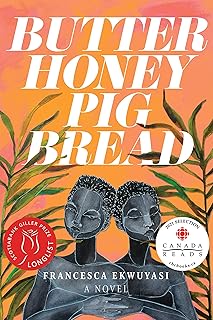3.5 Stars
This book has been on my radar since it was longlisted for the 2020 Scotiabank Giller Prize. Earlier this year, it was the runner-up in Canada Reads. (I didn’t listen to the Canada Reads debate because I had not read any of the books and I was listening to this one at the time and wanted to form my own opinion.)
The book focuses on three Nigerian women. Kambirinachi, who believes she is an ogbanje, gives birth to twin girls, Taiye and Kehinde. The sisters have a very close bond but a traumatic event erodes that connection. Much of the novel depicts how the estrangement affects them. Years later, the two reunite in Lagos where they confront what caused their rift.
The narrative is non-linear, divided among the three characters and moving back and forth between past and present. Taiye receives the most attention and so is most fully developed. Her letters to her sister, letters which Kehinde has belatedly received, also show Taiye’s unhealthy habits and fragile emotional state.
The novel excels in its examination of the effects of trauma and perceived betrayal. Kehinde is angry and resentful; she moves from Lagos to Montreal to start a new life though she suffers from poor self-esteem, especially as related to her body image. Taiye is plagued by guilt and attempts to numb herself by self-medicating with drugs and alcohol. Lonely without her sister, she becomes rather promiscuous.
The sisters live physically apart – Taiye moving between London and Montpellier and Halifax and Kehinde choosing Montreal – but they are brought together in Lagos because of their mother’s health. Though the twins avoid opportunities to openly communicate, a confrontation is inevitable. Unfortunately, when the climax does occur, it falls flat; the important scenes are handled very simplistically. Things have been left unsaid for so long that I think the two need to talk much more to recover from their emotional distance; I certainly expected more.
An element I did enjoy is the cultural explanation of mental illness. Kambirinachi would probably be diagnosed as a schizophrenic, but she believes she is an ogbanje, in Igbo culture a spirit child who is repeatedly born just to die. She makes the choice to remain with her human family, knowing that she will pay a heavy price. The voices of her Kin constantly call her toward death so she can rejoin them.
The novel is beautifully written so the narrative flows. And the many descriptions of Nigerian food certainly had my mouth watering. However, the story is one that has been told often; in fact, I just finished reading another novel by another Canadian (The Good Father by Wayne Grady) that examined the long journey to healing after a close relationship has been fractured. Considering the accolades the book has received, I was expecting more. Other than the cultural angle, there is not much new here.
Perhaps I’ll listen to the Canada Reads podcasts to discover more about the book.

No comments:
Post a Comment